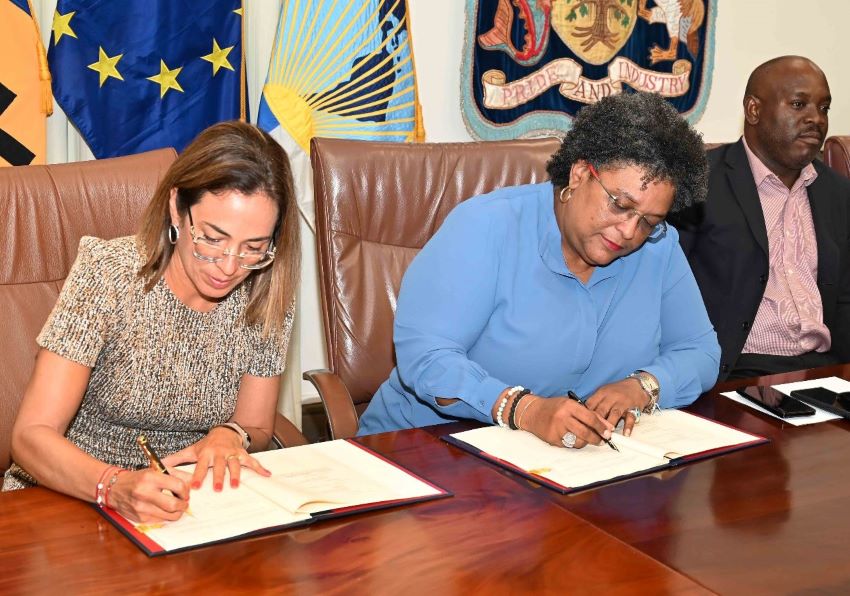
Barbados has signed a US $4.4 million grant agreement with the Inter-American Development Bank (IDB) to upgrade computer systems and facilitate training of staff in cyber-security to prevent future cyber-attacks at the Queen Elizabeth Hospital (QEH).
The funds will be used for the digital transformation of the QEH and related health institutions to improve efficiency and the quality of service to the public using new technology systems.
Speaking during the signing ceremony at Government Headquarters yesterday, Prime Minister Mia Amor Mottley said the Health Information Management Systems (HIMS) Project was a priority for her Government and stressed that the grant, along with the loan secured for the COVID-19 pandemic from the European Union, would be used to “cover” the HIMS.
Ms. Mottley insisted that the loan was “one of the cheapest” on the books, going at an interest rate of 1.4 per cent.
She pointed out that software purchased in the past to link the health records of the QEH and the polyclinics “did not talk to each other” and the investments made, in some instances worth millions of dollars, “are of no use to the country”.
“This grant, therefore, is the architecture that will allow us to get to that stage, because the cost of a health information management system, as much as I would like to believe that it can be covered by the grant, can nowhere come close to being covered by the grant,” she stated.
Ms. Mottley continued: “We want to make the experience of everybody going in a polyclinic, or a hospital in this country, public or private, seamless. And what has happened is that if you don’t have access to records, then the doctor will tell us that he/she can’t make the kind of judgements and determine the kind of treatment that he/she would otherwise be able to do, if he/she had access to the record. So, the major hurdle is to be able to make sure that the software that we use in the Health Information Management System is seamless, and that whether it is a private doctor’s office, polyclinic, or the hospital, when you go in, you should be able to pull up your records.”
Meanwhile, Minister of State in the Ministry of Health and Wellness with responsibility for the QEH, Dr. Sonia Browne, said enhanced digital services would solve long-standing requests for better service, appointment scheduling, greater collaboration across health facilities and address cyber security issues, which impacted the hospital last year.
“The staff at the hospital will indeed be grateful for it [training]…. With data, we are behind as a country, in terms of data for medical services, and we really can’t proceed with proper medical care without the data to back it,” she underlined.
Minister in the Ministry of Finance, Economic Affairs and Investment, Ryan Straughn, said the proposed digital transformation at the QEH would be transformational for the QEH and by extension, the Ministry of Health and Wellness’ “architecture”.
“This will set groundwork for being able to not only manage health records in the country but…to ensure the information being shared within departments in the QEH and across the broader health sector is going to be absolutely, absolutely, important.”
The IDB’s Barbados Country Office representative, Viviana Alva Hart, who thanked the “European Union for its excellent partnership on this programme” and others being worked on to support this country, said the programme would result in a “safer, more cost effective and timely patient care at the QEH”.
European Union Ambassador to the Eastern Caribbean, OECS and CARICOM/CARIFORUM, Malgorzata Wasilewska, stated that she was happy to partner with the Government, and noted that health systems resilience and digital transformation of health care facilities was one of the priorities identified by the EU.
“What we are doing … is the proof that we just don’t talk, but we also act. I am particularly happy that this shows that digital transformation, which is also important for Barbados, is a priority for the EU,” the Ambassador emphasised.
